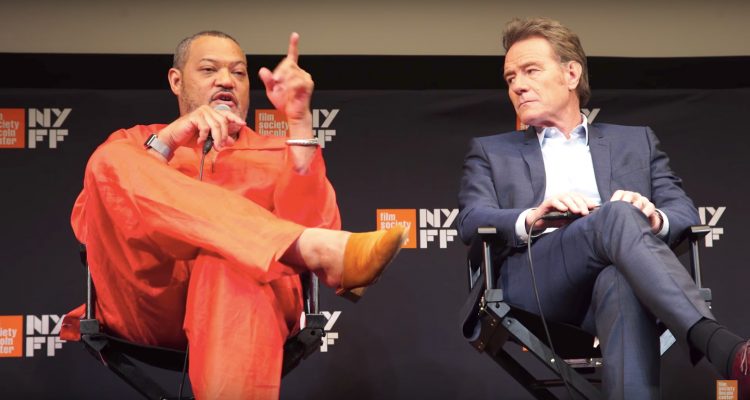The opening film of the fifty-fifth New York Film Festival is Richard Linklater’s “Last Flag Flying”, an emotional look at the complicated nature of modern patriotism and the unbreakable bond between service members. The film is a quasi-sequel to Hal Ashby’s 1973 classic “The Last Detail”. Similar to ‘Last Detail’, this retelling is based off a novel by Daryl Ponicsan. In Linklater’s version, the actors’ and characters’ names are different, but the central journey of the film exactly mirrors its predecessor. This allows Linklater to indulge his specialty, capturing the bittersweet passing of time on screen.
Bryan Cranston, Lawrence Fishbourne, and Steve Carrell star as three Vietnam vets with many shared regrets, who reunite in late 2003 to help bury Carrell’s son after he’s killed in Iraq. Linklater, Cranston, Fishbourne, Ponicsan, and J. Quinton Johnson (who plays a young Marine and friend to Carrell’s son) gathered at the festival to discuss the film.
 On whether ‘Last Flag Flying’ is a war movie
On whether ‘Last Flag Flying’ is a war movie
“It’s my kind of war movie,” Linklater explained. “A bunch of guys talking and no battles. A road trip. I wouldn’t really be interested in making a [typical] war movie.” He continued, “It’s a powerful thing to depict in cinema, it’s nothing to be taken lightly. I have mixed feelings about so many war movies.”
Linklater expressed his admiration for Ponicsan’s novel for the way it showed the dual effect of Vietnam and Iraq on the nation’s consciousness. “I just loved it because it was about the way these two wars talked to each other and echo one another and it’s really about the guy’s reflections. They usually don’t make war movies about thirty years later, sensing how it affected them. It’s usually mission based and about the immediate, so I was much more interested in the long term effects and how these guys changed, and what it does to you.”
Both Linklater and Ponicsan seemed uninterested in genre labels, an outlook that appeared again later when asked if the film was a “revisionist war movie”, much in the way “Unforgiven” is a revisionist western. “I don’t know if I fully accept that it’s revisionist, because ‘Unforgiven’ has the trappings of a western, its setting, its time, the way they all look. This doesn’t really have the trappings of a war movie, it’s so domestic, it’s a road movie, probably more in that genre, it just happens to be these vets in this particular situation. I really never thought of it in those terms, or what genre we were in.”

Ponicsan chimed in, “I kind of object to pigeonholing pictures. I prefer war movie to a road movie, but in my mind it’s an adult film, not in that connotation, but it’s a movie for grown ups about some pretty deep stuff that even filmmakers might not be able to get to the bottom of… I don’t like to compare what I’m doing to what somebody else has done. I don’t want to say ‘Well my movie is like that movie,’ because it just gets in the way of the originality. I want to do something special each time.”
On humor in tragic circumstances
“Last Flag Flying” is exceedingly sad overall, as it’s about burying a child, but it’s also frequently funny, channeling the coarse humor of “The Last Detail” even as the characters are older and wiser (or at least two out of the three are wiser). Linklater explained that to him, it’s only natural to find humor in darkness.
“I think [humor] is so important, because it’s so real. If you’re in the worst job you’ve ever had, or in the worst, crappy conditions, what’s always there? Humor. But when people go to represent [hardship], they think, ‘oh that’s terrible’, they cancel it by being so serious about it. These guys were hilarious, in the book and in life, and I think it’s appropriate, even in the worst of circumstances. I do like that combo, tragic and comedic right on top of one another.”
Following up, Johnson added, “I know that the humor is what makes the tragedy palatable. So if in your personal life, tragedy happens, loss of a job, loss of a loved one, if you just let that tragedy engulf you, I feel like that kind of takes the humanity out of it. The game is to be a present human being with your brothers in the sense of the human race and I think the humor allows us to say ‘Here’s this bad thing that happened, but it’s ok, I can digest this’.

